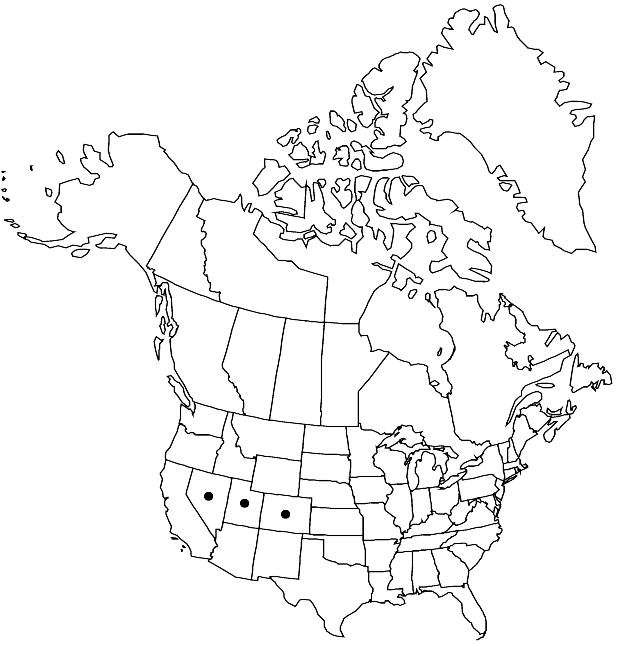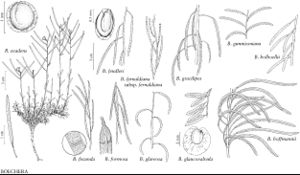Difference between revisions of "Boechera fernaldiana"
Phytologia 51: 370. 1982.
FNA>Volume Importer |
FNA>Volume Importer |
(No difference)
| |
Revision as of 22:54, 16 December 2019
Perennials; long-lived; (cespitose); sexual; caudex somewhat woody (sometimes with persistent, crowded leaf bases). Stems usually 1 per caudex branch, arising from center of rosette, near ground surface or slightly elevated on woody base, 1–3.8 dm, densely pubescent proximally, trichomes short-stalked, 4–8-rayed, 0.04–0.1 mm, sometimes mixed with stalked, 2-rayed ones, to 0.5 mm, usually sparsely pubescent distally. Basal leaves: blade narrowly oblanceolate, 1–4 mm wide, margins entire, ciliate along petiole, trichomes (simple), to 1 mm, surfaces densely pubescent, trichomes short-stalked, 4–8-rayed, 0.04–0.1 mm. Cauline leaves: 5–10, not concealing stem; blade auricles 0.3–2 mm, surfaces of distalmost leaves usually sparsely pubescent. Racemes 10–20-flowered, usually unbranched. Fruiting pedicels divaricate-ascending, straight, 5–20 mm, sparsely pubescent, trichomes appressed, branched. Flowers ascending at anthesis; sepals (purplish or greenish) glabrous or sparsely or moderately pubescent; petals white or purple to lavender, 7–12 × 1.5–4 mm, glabrous; pollen ellipsoid. Fruits divaricate-ascending, not appressed to rachis, not secund, straight or curved, edges parallel, 3.5–6.5(–7.5) cm × 1–1.6 mm; valves glabrous; ovules 30–72 per ovary; style 0.1–1 mm. Seeds uniseriate, 1–1.2 × 0.8–1 mm; wing continuous, ca. 0.1 mm wide.
Distribution

w United States.
Discussion
Subspecies 2 (2 in the flora).
Taxa treated here as subspecies of Boechera fernaldiana share many morphological traits, and most recent authors (R. C. Rollins 1993; N. H. Holmgren 2005b) did not recognize them as distinct. They are consistently separated by the characters listed below, show some degree of molecular divergence (C. D. Bailey et al., unpubl.), and their ranges are separated by ca. 500 km. They clearly represent genetically isolated population systems that warrant taxonomic recognition.
Selected References
None.
Key
| 1 | Petals purple to lavender; sepals purplish, moderately to sparsely pubescent; Nevada. | Boechera fernaldiana subsp. fernaldiana |
| 1 | Petals white; sepals greenish, usually glabrous, rarely sparsely pubescent; Colorado, Utah. | Boechera fernaldiana subsp. vivariensis |
